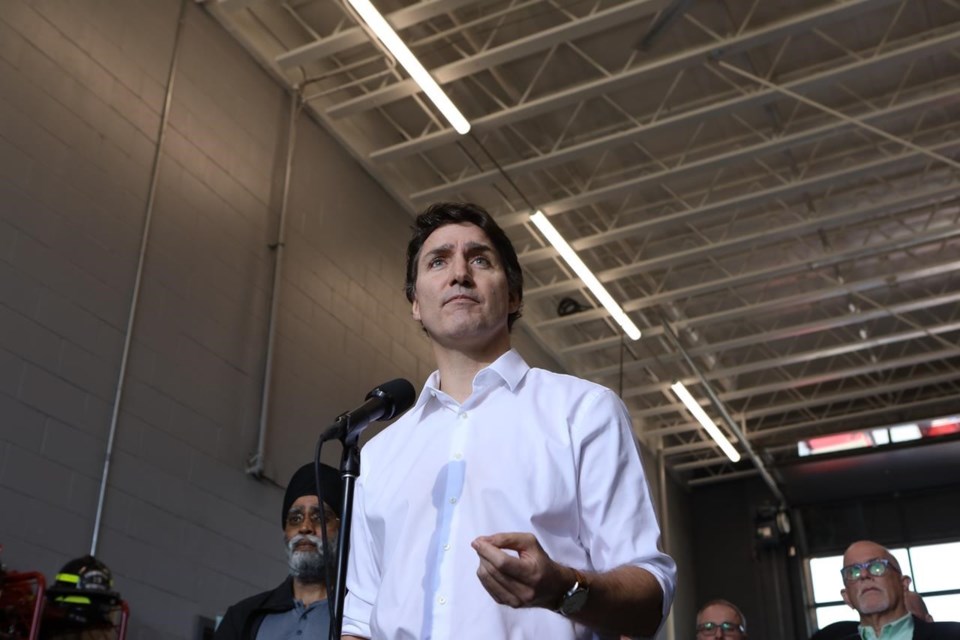WEST KELOWNA, sa���ʴ�ý — sa���ʴ�ý's dispute with Meta is a "test moment" for the country to stand against the social media giant that's making billions off people, but taking no responsibility for the well-being of communities it profits from, Prime Minister Justin Trudeau said Friday.
Trudeau made his comments in West Kelowna, one of several sa���ʴ�ý communities involved in evacuations of thousands of people last summer, while information about wildfires and escape routes were blocked on Meta's Facebook platform.
He called Meta an "irresponsible web giant," that had previously been making a huge profit sharing information from local journalists who worked hard to make sure people were properly informed.
"This is a test moment where countries are going to have to realize that either we stand up for journalism and the profession faced with internet giants that refuse to actually participate in it, or we bow down to them and allow them to make billions more dollars, while degrading the safety, well-being and communities that thrive in our democracy."
Meta has blocked Canadian news from Facebook and Instagram over the federal government’s Online News Act, which seeks compensation for news outlets whose stories are used on the social media feeds.
Trudeau said he knows there are many people trying to figure out ways to keep everyone informed, especially in emergency situations, but countries need to stand up for journalism.
He noted his government had the same disagreement with Google, but the company "stepped up" with $100 million to make sure that local journalism was thriving.
sa���ʴ�ý Premier David Eby announced last month that the province had worked out an agreement with Meta and had received assurances that it would work with sa���ʴ�ý emergency officials to deliver and amplify public information in case of natural disasters such as wildfires.
Meta began blocking Canadian news content on its platforms in August just before fires swept through sa���ʴ�ý's southern Interior.
Trudeau was in West Kelowna last August, just days after a wildfire destroyed hundreds of homes.
On Friday, the prime minister said he met with mayors and fires chiefs of those same communities, along with a number of families who lost homes in the sa���ʴ�ý Interior and who are still impacted by the situation.
“We know from the forecasts in Western and Northern sa���ʴ�ý, because of the dry winter … it is likely to be a very bad forest fire season," he said during a news conference at the West Kelowna firehall.
He said lessons learned last year would help minimize the impacts of the fires expected this summer.
sa���ʴ�ý's snowpack is at the lowest level ever recorded and drought levels are already high in the province's northeast.
Drought conditions in sa���ʴ�ý stretch back to 2022, and forecasters have said the province is heading into this summer with "multi-year" precipitation deficits
West Kelowna Fire Chief Jason Brolund met with Trudeau before the news conference on Friday with some requests.
Brolund became the face of the sa���ʴ�ý wildfires last summer as he described the battle against the blazes and the loss they incurred. The chief later spoke to a United Nations conference on climate change, saying the firefight was the toughest three days of his career as entire neighbourhoods burned.
He said fire crews were facing blazes that were nearly impossible for them to defeat, partly because of changing climate that made it easier for the fires to burn.
Brolund said he thanked Trudeau for doubling the tax credit for volunteer firefighters, which adds an extra $425 for each volunteer, but he wants that to be even larger.
He said he asked him to reinstate the joint emergency preparedness grants for training and equipment for fire departments, and they want the fire smart program rolled out on a national scale to have measurable impacts in communities.
"I felt like his ears were wide open," Brolund said of Trudeau.
Temperatures could reach record levels in sa���ʴ�ý's Interior this weekend, and Brolund said they're watching the weather closely.
June is historically the rainiest month and fire officials were hoping to get that this year, the chief said.
"If we don't, our departments are ready. We have new equipment, we have new training, we have firefighters in place," he said.
"What we have the most of is a sense in spirit of co-operation among the region. And we saw that today when the mayors and fire chiefs came together to share our experience with the prime minister."
This report by The Canadian Press was first published May 10, 2024.
Brieanna Charlebois, The Canadian Press



